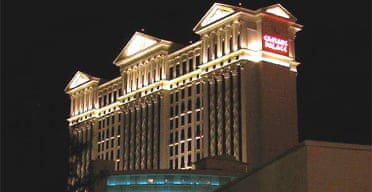In a boost for Barack Obama, a federal judge today ruled the Nevada Democratic party can hold caucuses at Las Vegas casinos for workers unable to make it to neighbourhood precincts for Saturday's primary.
The ruling means Senator Obama stands to gain from the support of legions of casino workers expected to attend the caucuses in question during Saturday's Nevada presidential primary.
State Party Chair Jill Derby said: "We began this process to highlight the participation of westerners, minorities, including Hispanics, and labour in choosing the Democratic nominee for president and today that effort was affirmed by the courts. "Despite the characterisation of some, this process is fair to all Nevadans, union member or not, whether they work within a 2.5-mile radius of the Las Vegas Strip or will caucus at their home precincts. "
"With 520 sites across the state, we look forward to having fair, inclusive and decisive caucuses," she added.
The ruling ends the Nevada teachers' union's attempt to shut down so-called "at-large" caucuses at nine casinos on the Las Vegas strip, the city's gambling centre.
The state Democrat Party planned those with a view to increasing participation among the shift workers who man Las Vegas's 24-hour casino operations.
In ruling against the teachers' union, Judge James Mahan of the US district court of Nevada ruled that the state Democratic party is a private association that must remain free from court interference in its procedures.
"We are talking about the party's First Amendment right to set its own rules," Mahan said in the courtroom before issuing his decision.
The casino workers' syndicate, known as the Culinary Workers' Union, endorsed Obama and some in the Nevada State Education Association's leadership have ties to New York senator Hillary Clinton's campaign. In addition, former president Bill Clinton has spoken in support of the legal action. The Clinton campaign denied colluding with the teachers' union on the suit.
The suit attempted to blunt the advantage Obama gained from the 60,000-member Culinary Workers Union's nod, giving it the feel of a proxy battle between the two Democratic frontrunners.
"We're glad that the Nevada court upheld the Nevada Democratic party's caucus plan which encourages voter participation," Obama campaign spokesman Bill Burton said. He said the Clinton campaign "believed the voices of workers should be silenced in service of their perceived political interest."
While the Obama camp was quick to declare victory, it's unclear how much mathematical advantage the Illinois senator will gain. Fewer than 6% of the total delegates in play on Saturday are expected to be chosen at the workplace caucuses, but Clinton's narrow win in New Hampshire shows that any advantage, however marginal, could be the key to victory in Nevada.
The teachers' union had hoped to persuade the court to prohibit the Nevada Democratic party from holding the caucuses on the strip. The union contended that those caucuses give unfair electoral advantage to the casino workers by assigning a disproportionate number of delegates to the casino-based caucuses. If true, that would appear to give Obama an edge.
The teachers' union said that in contrast to the casino workers, some of its members will not be able to participate in the caucuses because they will have to staff the schools where voting takes place.
The teachers' union further alleged the workplace caucuses violate state election law because they are based not on the number of registered voters in a geographic precinct but on the number of workers participating the caucuses.
Lawyers for the state Democratic party and the Democratic National Committee argued that the teachers' union and other plaintiffs had ample time to raise those concerns before the plan were finalised. Changing the caucus plan less than two days before they are to be held would throw the process into chaos and risked sanctions from the Democratic National Committee, they argued.
Lynn Warne, president of the teachers' union, said after the decision that the custodians who will have to man the schools at which some caucuses will take place, should also have an opportunity to participate in those caucuses.
"If worker accommodations are going to be made for some employees, they should be made for others employees," she said.
Jill Derby, chairman of the Nevada Democratic Party said she hopes the two sides will now unite and move forward. She said the delegate selection scheme is fair, despite the teachers' union complaints.
"The court has validated the plan," she said. "If [the plaintiffs] didn't read it, that's not our fault."
Asked to comment on the appearance the parties in the suit were stand-ins for the Obama and Clinton camps, she said, "I don't think that has been helpful."
The Nevada caucuses are expected to break the tie between Obama and Clinton, who split the results in Iowa and New Hampshire.
Polling in the state has been slim, but recent surveys show those two running neck-and-neck, with John Edwards in third place.
